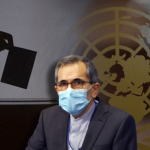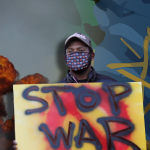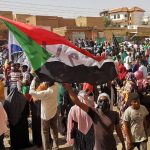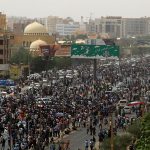Egypt considers acting as a mediator in the Sudan crisis.


Sudan is navigating a delicate transition to a civilian democratic administration following mass uprisings that deposed a decades-long dictatorship in April 2019. According to a statement issued by Egypt’s Foreign Ministry on Jan. 8, discussion between political parties will resolve the present situation and prevent the country from devolving into anarchy.
Egypt stated that it is ready to assist the future transitional administration “in any manner” and that “Sudan’s security and stability are an intrinsic element of Egypt’s and the region’s security and stability.” On Jan. 13, the Al-Araby Al-Jadeed newspaper quoted an unnamed Egyptian source as saying that Cairo has begun to intensify its contacts with the parties involved in the Sudanese crisis in order to play a mediating role in reaching an agreement that ensures the continuation of the transitional phase and the appointment of a consensual prime minister until the country’s democratic transition process is completed.
Sudan has been in a state of political unrest and instability since the army seized control in October 2021, breaking a power-sharing agreement with civilian partners in governance and clearing the way for democratic elections. The initiative, according to Volker Perthes, Special Representative of the Secretary-General and leader of UNITAMS, would be confined to undertaking indirect and individual exploratory meetings among Sudanese stakeholders in the goal of progressing to a second round of direct or indirect negotiations. The army has not raised any objections to the idea, he told reporters on January 10. The effort, however, will not provide any political concept, draft agreement, or suggestion to fix the political crisis, according to Perthes, because its job will be confined to helping the political process.
Related Posts
UN authorities are requesting that Sudanese stakeholders submit their perspectives in order to move the process ahead, in the hopes of achieving consensus on areas of agreement and disagreement before the end of the negotiations. However, the pro-democracy organizations and political parties that were deposed from power refuse to engage in direct discussions with the military and insist that civilian administration be established without any military involvement. According to Sudanese political expert Osman Mirghani, the UN plan comes at a time when Sudan is experiencing a full political blockade, with no opportunity of inter-Sudanese discussion.
According to Al-Monitor, the suppression of protestors seeking the army’s disengagement from politics, as well as the consequent losses, worsened the situation and increased tensions between the civilian and military components. He believes the initiative will lead to communication in order to find a solution before reaching a point of no return. Sudanese Prime Minister Abdalla Hamdok resigned in early January, weeks after returning to power under a contentious arrangement with army chiefs.
Hamdok was placed under house arrest during the army takeover in October, but he was released on Nov. 21 after reaching an agreement with army head Abdel Fattah al-Burhan. Protesters, on the other hand, were against the accord and any cooperation with the military. Under the terms of the agreement, Hamdok was to oversee a technocratic administration until early 2024 elections. In a meeting on January 12, the UN Security Council’s 15 members voiced their support for the UN plan to settle the Sudanese issue. Perthes said during the Security Council meeting that removing the state of emergency in Sudan is “the final ray of optimism in the country,” emphasizing that this move is “the last glimmer of hope in the country.”
Kholood Khair, managing partner of Khartoum-based Insight Strategy Partners, a think tank focusing on transitional policy, told Al-Monitor that there is a lack of commitment from the UN to the inclusive dialogue process — they launched the initiative without consultation and have not spelled out their vision for how the process will be shaped — and reliance on too few international actors to support it. “Perthes has also lost a lot of trust with the street after supporting the 21 November deal [that returned Hamdok to his post] and urging the Sudanese that they should back it, despite the fact that it was a severely defective agreement,” she said. “The generals’ commitment to this process should be assessed by the extent of state repression that the generals accept during protests,” Khair said. The security forces are repressing protestors with violence, which does not inspire trust in a process that the generals support.”
Protesters have been coming to the streets on a daily basis to demand that civilian government be established. Since the October coup, at least 60 people have died in skirmishes with security forces, according to doctors linked to pro-democracy parties. While the UN plan is widely regarded as the sole real attempt now underway to settle Sudan’s political dilemma, Egypt continues to remove itself from the country’s problems. Despite the fact that Sudan is a crucial element of Egypt’s national security, Cairo’s engagement in the Sudanese conflict is limited in comparison to other regional and international actors that appear to be more prominent, according to Mirghani.
He emphasized that Egypt’s contribution to resolving the current issue is critical, given that Egypt is more equipped than any other country to comprehend the nature of the political situation in Sudan, according to the two countries’ long history of connections.
Cairo, according to Mirghani, is attempting to strike a balance owing to sensitivities that may develop among some Sudanese political elites over military backing at this time, which may impede Egypt from dealing with Sudanese matters as it should.
The army’s assumption of power was not condemned by Egypt. According to a statement released by the Ministry of Foreign Affairs a few hours after the coup, it simply urged Sudanese stakeholders to remain calm and practice self-control. “All Sudanese parties must give precedence to the country’s greatest interest via national consensus,” Cairo said. Meanwhile, the Egyptian viewpoint is similar to that of Saudi Arabia and the United Arab Emirates (UAE), owing to the fact that the leaders of the three nations had strong ties with the Sudanese army’s commanders.
Initially, the three nations restricted themselves to pleading the Sudanese parties to maintain calm and self-control. The UAE and Saudi Arabia’s positions soon shifted when they signed a unified statement with the United States and the United Kingdom. The Quartet advocated for the “complete and urgent reinstatement of a civilian-led transitional administration” in a statement released in November. According to the Wall Street Journal, Burhan secretly went Egypt the night before assuming power and spoke with Egyptian President Abdel Fattah al-Sisi as part of a geopolitical maneuver to gain support for his decision.
The Egyptian government did not respond to the Journal’s allegation, but Egyptian Foreign Minister Sameh Shoukry subsequently acknowledged that his nation does not favor one side over another, and that Egypt supports Sudan’s stability while staying out of its domestic issues. “Egypt is likely to back the military component in Sudan,” Tarek Fahmy, a political science professor at Cairo University, told Al-Monitor. He disputed, however, that the rapprochement was due to Egyptian concerns over the civilian component. “Cairo had good ties with the civilian and military components during the previous era [before the coup], which was evident in their contacts and meetings,” he said.
Cairo would lose credibility, according to Fahmy, if it announced Egyptian support for one party at the expense of another. Because of Egypt’s particular relationship with Sudan, it has not done so. “The Egyptian position on the Sudanese crisis is in line with the Sudanese people’s decisions, and it continues to support the transitional phase,” he continued. “Of the Arab axis, Egypt is likely the most pro-military as a concept, not merely a policy,” Khair added. “Egypt’s affinity for the military originates from a variety of factors, the most important of which are historical links between the Sudanese Armed Forces and the Egyptian army,” she explained. Sudan is also seen as Egypt’s hinterland and a natural extension of its direct area of influence.”
The third reason, according to Khair, is the issue of the Grand Ethiopian Renaissance Dam, which Egypt considers a national security issue linked to their survival. As a result, Cairo must secure full support from Sudan and maintain coordination between the two countries in order to put pressure on Ethiopia. “In the end, the Arab axis may seek a replacement for Burhan, since he is unable to unify all security players or bring about stability to fulfill the goals of his foreign sponsors,” Khair said.












